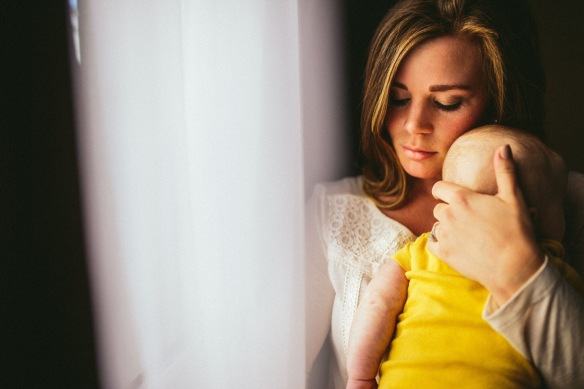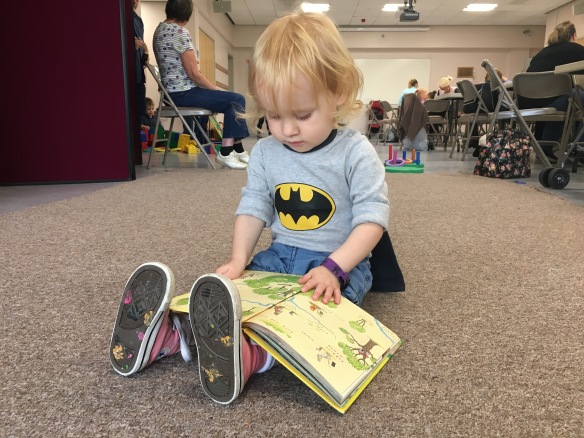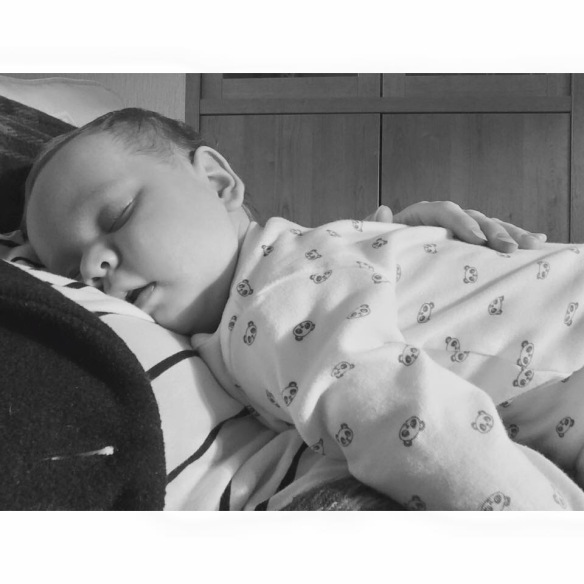
This must be one of the most common questions asked by parents in the West and yet, while many around them are quick to answer with suggestions such as colic or reflux, not many can explain exactly why and what to do about it.
I hear time and time again, from mums who visited their GP or health visitor and were told, ‘It’s *just* colic.’ and ‘Baby will grow out of it in a few weeks.’ What this blanket response fails to do, is look at the possible health issues, that science is rapidly discovering, could in fact be the true cause. Health issues that aren’t just mild, rare and manageable but are so common and so severe that they could be one of the main causes of Britain’s current crisis of male and female Post Natal Depression, along with other mental health illnesses.
For years parents have been robbed of sleep, peace and feelings of pride and accomplishment that should come a few times, each day, as a new parent but for many, is not. Western culture, has taught us that babies cry and we just have to deal with it but this isn’t the case in all countries. In fact, it is widely reported that babies in Africa don’t cry as much as Western babies. One blogger reports on her interpretation of why this is, in telling her story of when she returned to her home town of Kenya to give birth to her baby. She noted that in Kenya, “The understanding is that babies don’t cry. If they do – something is horribly wrong and must be done to rectify it immediately.”
Ignoring babies’ cries is extremely common practice, here, in the UK and something that most people don’t tend to have too much concern over. Yet, many mums are feeling in their gut there is something wrong when their baby cries. Otherwise known as, instinct! But time and time again, she is told by everyone in her world to ignore it. That very important, fantastically evolved human ability that helps us to monitor our baby’s health and wellbeing, allowing us to attune ourselves to their needs, their hunger, their fears and their tears. Yes. That’s right. Ignore it! Because babies just cry.
What fascinates me the most, is that the science is clear on this one. A baby crying, is a baby communicating a need to his caregiver. That need may be hunger, thirst, comfort, reassurance, protection, or illness, all of which need to be met by the caregiver. Yet, when a parent raises a concern, they are met with apathy and told not to worry. You can’t imagine (or perhaps, you can if you are a parent reading this) what kind of affect that has on a mothers’ primal instinct. Well, I’ll tell you. When the world tells you your instinct is wrong, you learn not to trust it. When you don’t feel like you can trust your own instinct, you question your entire parenting capability. When you don’t trust your capability as a parent, your mental health stops looking so good and problems start to arise.
There are many reasons as to why this became such a popular cultural practice. The main culprit being a product of old-fashioned Victorian values. During this period, it was widely believed that if you gave into your babies demands (needs!!!) then you would not be able to raise proper gentlemen and women. By giving into their demands (needs!!!) you would, in fact, spoil them. All these years later, and while second-wave Attachment Parenting (or as I like to call it, Parenting) comes back around, and some are realising that limitlessly holding your baby, breastfeeding them to sleep and allowing them to sleep in your bed, actually doesn’t create spoiled brats and, actually, as many are finding, creates strong bonds and children that grow to be kind and compassionate human beings. While this is the case for some parents, many are being left behind, as a result of old, cultural beliefs refusing to shift and also, a glitch in the training of our health proffessionals.
Health professionals, those wonderful, reliable, only people in the world who can help you during this horrible, painful time, who are so wrongfully misinforming parents with outdated advice and ignoring clear symptoms of illnesses such as dairy intolerance or tongue tie, on such a huge scale.
What is most concerning about this kind of response and lack of investigation, is the impact the failure to discover the true nature of the symptoms can have on the entire family, most specifically on their mental health.
So, what can you do if your baby is crying and you don’t know why?
Know what is normal and what isn’t!
- The first thing to do is to research what is normal! One big reason mums get so worried, is because they don’t know a thing about growth spurts and how this can affect feeding. Both breastfed and bottle fed infants will require an increased amount of milk when they hit a growth spurt, because their bodies are growing at such a rapid rate. Makes total sense, now! But if you don’t know what to expect, you’re not going to get very far. Most parents, today, believe that when a baby cries to be fed more, this must be a sign to wean them early or move them onto a ‘hungrier baby’ type milk. Wrong! Just increase the amount of milk your baby receives. Follow your baby’s lead. He will let you know when he needs more and when he doesn’t but he will never say, ‘Erm, mummy, I think I need some mushed up vegetables, now.’ when he is 4 months old.
- Research what is normal infant sleep! Another great mistake our culture makes, is the repeatedly asking a mother, after only a week (and forever, thereafter) of her baby being earthside, if the baby is sleeping through the night, yet. This gives the impression that babies actually sleep through the night. Ok. Some wonderful, amazing babies do in fact sleep through the night but they are in the minority! The majority of babies wake at night, because it is in their biology to do so and, for many, no amount of sleep training will change that. Not only this but studies show sleep training is bad for babies’ brains, as well as bad for breastfeeding. Babies aren’t supposed to sleep through the night but when they don’t do what the parent expects them to do, the parent blames no one but themselves. ‘It must be something I am doing wrong, everyone’s baby sleeps through the night apart from mine’. Even health visitors are asking this question to new mums. The pressure becomes so intense that parents start to lie. *NERVOUS GIGGLE* ‘Oh, yeah. He sleeps really well, we get loads of sleep!’ When other parents hear this, they too believe they are the only ones in the world who have a baby who won’t sleep through and the cycle continues. Thankfully, a little research on websites such as the wonderful Infant Sleep Information Source show, through lots of evidence, that this isn’t actually the case!
- Look into Attachment Parenting and find your closest APUK branch for support. For generations, we have believed that separating ourselves from our baby is a good thing, when, in reality, has probably lead to a lot more problems than it has aimed to solve. Attachment Parenting offers real solutions to why your baby may be crying, as well as solutions to sleep deprivation without going against your natural instincts.
- Are you breastfeeding? Does it hurt? Question it! So many mums will be told, ‘The latch looks fine.’ but if that baby is making your nipples burn, that’s a sure fire way to tell you that the latch isn’t fine and something needs fixing or tweaking! Seek REAL breastfeeding help. Most GP’s, Midwives and Health Visitors in this country, receive minimal training on breastfeeding and very often give out bad advice to mums. That’s not to say all health professionals are complete novices when it comes to breastfeeding but it is a really big problem in this country, at the minute, and all mums should be aware of that when seeking their help with breastfeeding. Find your local breastfeeding support group on Facebook and in your local Sure Start centre, where you will find trained breastfeeding peer supporters. Find your local La Leche League, who will also have a Facebook group or page, as a point of contact. Source a breastfeeding counsellor (NCT offer this service for free!) or an Internationally Certified Lactation Consultant (IBCLC). If any of this isn’t possible, read the websites I have linked in the text above, including the amazing Kelly Mom website. I personally use Kelly Mom as my main go-to for any breastfeeding questions but use whatever works for you. Try to stay away from google and mumsnet boards. We are one of the worst countries in the whole world for breastfeeding myths. This is the best way to avoid them!
- Bottle or breastfeeding. Does your baby cry excessively despite seeing to all of his immediate needs and all the above mentioned? Has your baby been checked for tongue-tie or a food allergy/intolerance? My best guess would be, no. This is such a grey area, currently, within our health system. Evidence is still emerging for tongue tie and food intolerances, and so, health professionals are not fully informed on all of the new information, yet. So a trip to your GP with concerns in these areas, could well leave you disappointed. Again, research! The links above will help you gain insight into food intolerances, as well as this website http://www.cowsmilkallergy.co.uk. Join the Facebook support groups available by searching ‘CMPA’ and ‘CMPI’ which stands for Cows Milk Protein Allergy/Intolerance. You will find a wealth of information and support and gain advice from mums who know exactly what you are going through. As for tongue tie, the wonderful Milk Matters will tell you all you need to know. Milk Matters are independent Internationally Board Certified Lactation Consultants, in West Yorkshire, who specialise in treating babies with tongue tie, as well as other difficult to resolve feeding problems in both bottle and breastfed infants. They are very passionate about their work and raising awareness on tongue tie and will often answer many questions for free, from their Facebook page. The founder is also the writer of a famously successful breastfeeding blog, Analytical Armadillo, which is another great source for information on all things infant feeding. Both tongue tie and food intolerances (as well as some breastfeeding problems, such as oversupply/fast let-down) can produce very similar symptoms, including excessive crying or fussiness!
- Lastly, I want to mention Osteopathy. Something that until I had friends with tongue tied babies, I had never heard about. I am still learning about them but one thing I do know is that when it comes to babies, they work wonders! One mum I know had a baby with tongue tie but his neck muscles were so complicated that they would sometimes hide the tongue tie. When the mum drove to the tongue tie clinic – although previously the same IBCLC had witnessed the tongue tie- today, it was no longer visible. The mum took a trip to an osteopath and when she returned to the tongue tie clinic, as if by magic, the tie was visible again and the IBCLC was able to revise it.
So, I guess what I want for you to take from this is that if you feel in your gut that something isn’t right when the world tells you it’s fine and starts to make you feel a like you are going crazy. Stop! You are not crazy. You are a mother who is in tune with her baby’s needs and there are other options you can look into, other that “colic” and “reflux”. This list is in no way comprehensive, either, but I’m hoping it will give you a starting point to finding the correct solution to your problem.
I hope you can find the support that you need and I hope you can always trust in yourself and be guided by your instincts.
To stay updated on my posts, please follow me on Facebook










